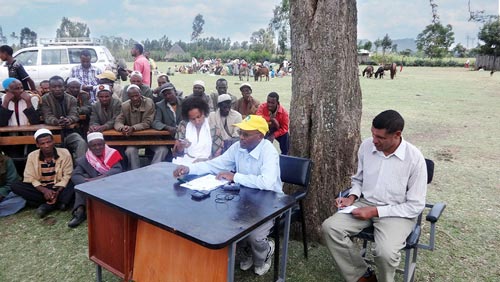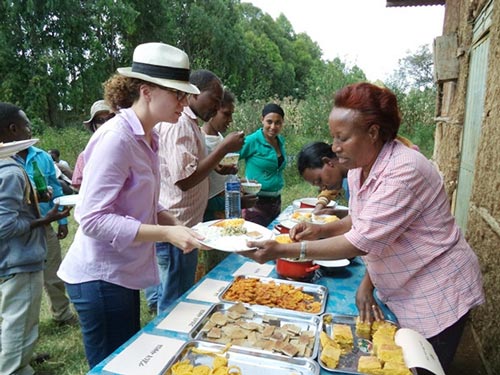By Adefris Teklewold/CIMMYT
Farmers spoke of their success with new quality protein maize (QPM) varieties to senior officials from the Canadian embassy in Ethiopia during recent visits to CIMMYT-Ethiopia sites. The visits focused on the status of the Nutritious Maize for Ethiopia project (NuME), which is funded by Canada’s Department of Foreign Affairs, Trade and Development (DFTAD). NuME aims to reduce malnutrition and promote food security in Ethiopia through the adoption of QPM, whose grain contains almost twice the lysine and tryptophan as non-QPM maize grain.

Jennifer Bloom, DFATD’s NuME project team leader and the second secretary (development) at the Embassy of Canada, and Abebech Assefa, the embassy’s team leader for Food Security and Agricultural Growth, visited farmers and learned about their feelings toward the adoption and promotion of QPM. The farmers also discussed their perspectives on the opportunities and constraints of project implementation with the Canadian representatives. Assefa, accompanied by three other embassy staff members, participated in a field day in the Meskan District of the Southern Nations, Nationalities and People’s Region of Ethiopia.
During the field day, the visiting delegation observed the performance of two QPM hybrid varieties, BHQY-545 and AMH-760Q, adapted to the area. Farmers carrying out the field demonstrations shared their reactions to the newly-introduced QPM varieties. Farmer Genet Assefa noted that her plots have showed impressive results with the QPM varieties she planted compared to other plots in the area. “All the proper agronomic activities were employed on my plot based on advice from experts,” she said, adding that “QPM should be promoted and made accessible to all farmers so that we can all ensure food and nutritional security and increase our incomes.”

Abebech Assefa led a discussion after the field day and showed appreciation for the farmers who participated in the field demonstrations. She said she was grateful for their willingness to test new QPM varieties on their farm plots and to experience the benefits of QPM in improving food and nutritional security in Ethiopia. Bloom visited several demonstration sites and tested QPM food products during a field day organized in Bure District, Amhara Regional State. She requested the farmers’ opinions about QPM technology. The majority responded that they were satisfied and specifically asked for the seed of BHQY-545 to be made available to everyone in need. Farmers said they favor BHQY-545 because it provides up to four or five cobs and matures early, and they value the BHQ-760 variety for its long cobs.
The farmers said their “most critical concern” regarding the adoption of QPM varieties was that abundant quantities of the quality seed be available at the right time. Local administration and bureau of agriculture officials, who accompanied the DFTAD delegation, expressed their commitment to providing the seed. Bloom ended her visit by thanking the officials for attending the field demonstrations and the farmers for their participation and courage in discussing the advantages of QPM varieties and their concerns about them.
 Capacity development
Capacity development 
